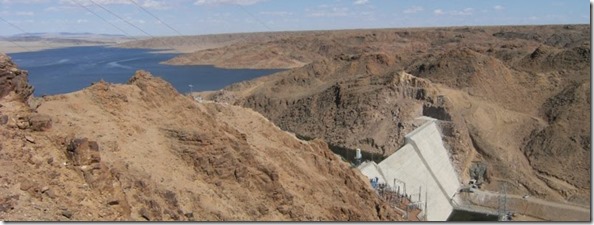At the 41 Session of the World Heritage Committee in Krakow, the RwB Coalition representatives had fruitful discussions with the delegation of the State of Kuwait and presented the following letter to : H.E. Dr. Meshal Johar Hayat , Ambassador and Permanent Delegate, Permanent Delegation of the State of Kuwait to UNESCO:
RE: Kuwait-Mongolia Energy Cooperation and World Heritage Convention
Your Excellency:
The State of Kuwait is known as a true friend which seeks to develop long-term mutually beneficial relations with Mongolia. Kuwait’s assistance to development of most needed road network in Mongolia is an important contribution to its sustainable development.
We, the members of Rivers without Boundaries Coalition, are addressing You to explain our concerns regarding Kuwait’s potential support to the development of Mongolia’s energy system, specifically the planned construction of hydropower dams on rivers Eg, Shuren and Orkhon – tributaries of in Selenge River. Dams in this river basin may negatively affect the most important river system of the country as well as Lake Baikal, a World Heritage Site (#754) and Selenga Delta Ramsar wetland of international importance.
The Shuren Hydropower Plant construction has been explored by the Kuwait Fund for Arab Economic Development for possible funding since 2012 and is still displayed in its Funds’ database[1][2]. Mongolia’s hydropower development plan has been seriously questioned by the World Heritage Committee in 2014, 2015 and 2016[3] and subject of special attention of the World Bank Inspection Panel. It is confronted by many environmental NGOs and has added serious tensions to international relations between Mongolia, Russia and China[4].
We would like to point to readily available less controversial, less destructive and more economically and socially beneficial alternatives that will develop a more sustainable energy system in Mongolia, without damaging important water systems in a water-deficient country severely stressed by climate change. We call on all friends and donors of Mongolia to support such sustainable energy development and refrain from sponsoring controversial hydropower dams.
Hydropower plans in Selenge River basin evoke concerns about likely disruption of natural hydrology, sedimentation and related habitat dynamics, migration and spawning of aquatic organisms, natural thermal and chemical qualities on freshwater ecosystems. They also may negatively affect globally important bird areas downstream from dams in Mongolia and Russia. The World Heritage Committee initiated a monitoring mission undertaken by IUCN in spring 2015[5], which confirmed serious potential adverse impacts from planned hydropower and developed comprehensive requirements for strategic, cumulative and individual impact assessments of all planned dams in Lake Baikal Basin to be implemented and presented to convention bodies before any hydropower construction project is approved. This was reflected in decisions of the 39th Session of the World Heritage Committee. Despite those decisions, the State Party of Mongolia in 2015 started preparatory construction works for one of three planned dams, which was halted only after the China EximBank, reassessed project risks and by April 2016 has frozen the loan supporting this construction.
However, Mongolian government continues to seek funding for its HPPs with the Speaker of Mongolian Parliament visited Kuwait in December 2016 and restarted negotiations on funding of Shuren Hydro by the Kuwait Fund for Arab Economic Development[6]. Mongolia has not completed any of assessments prescribed by the World Heritage Committee and informed the Committee in January 2017 that it is not in a position to undertake an early cumulative impact assessment given that the project feasibility studies are yet to be completed by the MINIS Project supported by the WB loan. We believe that decisions of the WHC Sessions should be implemented before any decision on development and funding of new dams is made.
Meanwhile Mongolia’s wind and solar potential is at least 2500 greater than its hydropower potential. Wind\Solar capacity installed in 2015-2017 will exceed 150 MW, while development of large hydropower capacity would take at least a decade. The maneuvering capacity that is an important necessity can be and is being achieved by such technologies as pumped-storage hydro or large scale battery capacities. Upgrade and interconnection of transmission grids of Mongolia can ensure much better reliability of energy supply from existing sources. Therefore sustainable development of Mongolia’s energy system can be much faster and more efficiently achieved by a combination of low-cost measures alternative to development of large hydro.
We kindly request the Government of Kuwait to use its friendly influence to help convince the Government of Mongolia to undertake and submit to the World Heritage Committee results of the Strategic Environmental Assessment (jointly with Russia), Cumulative Impact Assessment, individual environmental impact assessments for every planned hydropower project before any further decisions on feasibility of those projects are made and any financial institutions are asked to support them.
We would also ask the Kuwait Fund for Arab Economic Development to assess opportunities to invest in alternative options in developing sustainable energy system in Mongolia other than large hydropower. Such assistance may bring faster and more beneficial positive developments, than investment in risk-prone hydropower megaprojects, which may take several decades from planning to energy production.
We stand ready to provide any additional information or clarification to the agencies of Kuwait on potential hydropower impacts in Selenge-Baikal basin and alternative options for Mongolia’s energy system.
We take this opportunity to reiterate to the Kuwait Government our appreciation of your support to the development of Mongolia.
Sincerely Yours,
Sukhgerel Dugersuren
Mongolia Coordinator of the Rivers without Boundaries International Coalition.
Evgeny Simonov, Doctor of Conservation,
International Coordinator of the Rivers without Boundaries International Coalition.
July 10, 2017
[1] https://kuwait-fund.org/
[2] https://www.transrivers.org/2013/928/
[3] http://whc.unesco.org/en/list/754/documents/
[4]http://en.kremlin.ru/events/president/news/52211
[5] http://whc.unesco.org/document/137186
[6] https://www.news.mn/content/print/320527 and http://en.montsame.mn/politics/7934 http://www.sanfrancisco.consul.mn/eng/index.php?moduls=101&id=523


